Local authorities help fertiliser manufacturing process
By Ananda KANNANGARA
Dumping garbage by people everywhere has become a nuisance. This
situation not only pollutes the environment but also helps mosquitos to
breed in abundance.
|
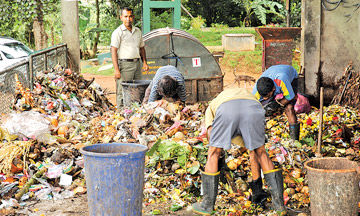
A worker segregating perishable and degradable garbage |
|
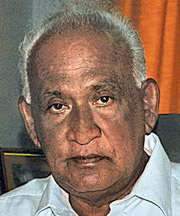
G. H. Buddhadasa |
Therefore, it is important to educate people on the correct method of
dumping garbage.
While local authorities spend millions of rupees annually to remove
heaps of garbage and clean the environment, the Health Department too
spends colossal sum of money to eradicate dengue menace. According to
reports dengue has claimed over 150 lives in the recent past.
The latest Health Department statistics reveal that hundreds of
people fall sick every month due to dengue and it is the duty of general
public also to destroy dengue breeding places by removing garbage.
Although garbage problem has become a nuisance to the society, it is
happy to see four of local bodies including the Colombo Municipal
Council have come forward to produce fertiliser out of garbage. This
will help not only to clean the environment, but also to earn a
sufficient income.
CMC, Commissioner, Bhadrani Jayawardhane said she had distributed
nearly 3000 garbage bins to households in the city limits to collect
their home garbage and to make compost fertilizer.
"Although we buy these bins at high cost, we provide them at very
reasonable price."
She said except for few people, majority household produce fertilizer
according to instructions given by the CMC".
|
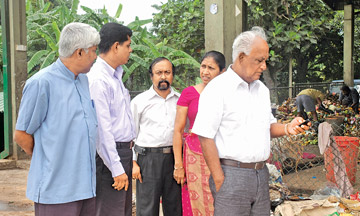
G. H. Buddhadasa, with officials at a garbage site |
|
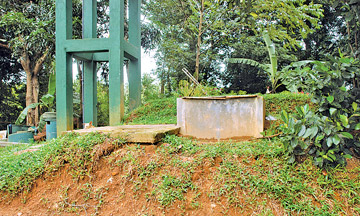
Power generating from garbage |
|
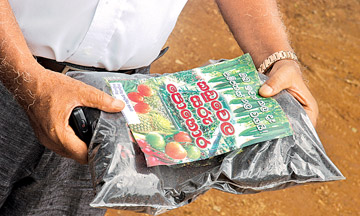
Fertilizer manufactured from garbage |
They produce fertilizer in a methodical way and they use them for
their home grown vegetables and flowers. She said there is a huge demand
for garbage bins and therefore another stock of 2000 bins will be
distributed among residents within the next three months.
Manufacturing fertiliser from garbage has also commenced by three
other local bodies, the Moratuwa Municipal Council, the Kaduwela
Pradeshiya Saba and the Bandaragama Pradesiya Saba in the Kalutara
District.
Moratuwa Municipal Council Chairman, W. D. Samanlal said his Council
distributed over 1000 garbage bins to families in Katubeddha, Moratuwa,
Egodauyana, Rawatawatta and few other places.
Majority families use these bins according to instructions given by
higher authorities and 15 to 20 tonnes of fertilizer is manufactured by
residents each day from their daily accumulated garbage and other waste
items.
He said the Moratuwa MC also owns a dumping ground near the Moratuwa
Police Station and the manufacturing plant produces sufficient compost
fertilizer every day.
"We collect rotten vegetables and fruits from the Katubeddha,
Moratuwa and Molpe weekly fairs and produce nearly four tonnes a day.
He said these fertilizer will be sold to public from next year.
"We also collect waste from markets, boutiques in the area. Residents
too provide their daily waste to our garbage collecting vehicles".
Waste items such as rubber, plastic, polythene, tins and pieces of
unused iron are separated and sell them for recycling. He said his next
aim is to produce electricity from fertilizer and wish to sell them at
very reasonable rates.
Kaduwela Pradeshiya Saba Chairman G. H. Buddhadasa when interviewed
by the Sunday Observer said large number of garbage bins are kept at
main junctions, near schools and other thickly populated places in the
Kaduwela area for the benefit of general public, residents and
schoolchildren.
"We also have a fertiliser manufacturing plant at Wele Handiya,
Kaduwela and produce a large quantity every month.
The Chairman said that no complaints are made by residents about
heaps of garbage, since they have deployed a group of workers round
the clock to collect garbage within the entire Kaduwela area.
We also have special plans to collect rotten vegetable and fruit
waste from two weekly fairs at Kaduwela and Aturugiriya.
He said his Pradeshiya Saba earns over Rs. 20,000 a month from
selling fertilizer and also about Rs. 35,000 from used tins, plastic,
polythene and other nondegradable items.
He said a three-wheeler was purchased recently for the use of the
Pradeshiya Saba from money earned by selling fertiliser and other
nondegradable items. "In addition, we also generate electricity from
waste and supply them to the Nawagamuwa Devalaya". Among all Pradeshiya
Sabas in the country, the Bandaragama Pradeshiya Saba has become the
country's first local authority to set up a fertilizer manufacturing
plant in 2007.
Chairman Manoj Sanjaya said they have launched an uninterrupted
garbage collecting service every day commencing from 5.30 a.m.
He said garbage is dumped on a two acre land at Deldora Watta at
Millaniya where the fertilizer manufacturing plant is installed.
We collect garbage from three weekly fairs at Bandaragama, Galpatha
and Millaniya and produce about 50 tonnes of fertiliser a month.
He said the Pradeshiya Saba earns nearly Rs. 20,000 a month from
nondegradable items such as pieces of iron, plastics, tins and
Polythene. |

